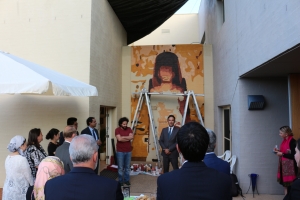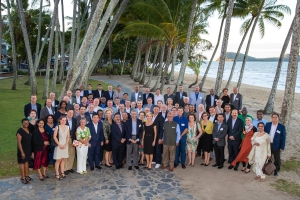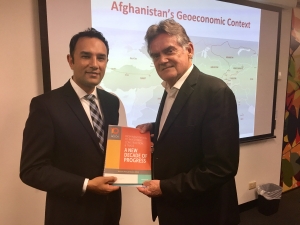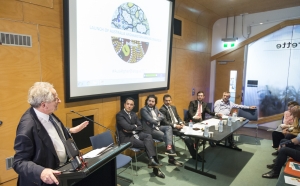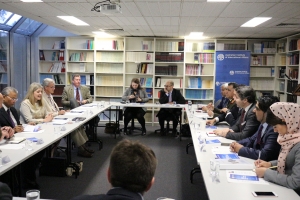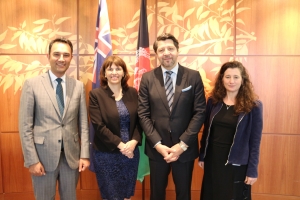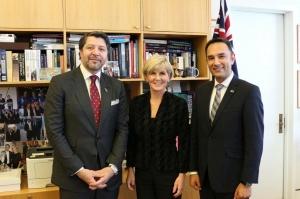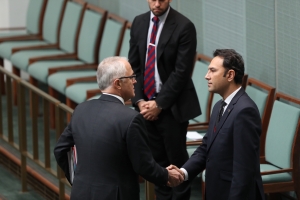Mr Wahidullah Waissi submited his letter of credential to Sir Peter Cosgrove, the Honorable Governor-General of Commonwealth of Australia as the fifth Ambassador of Islamic Republic of Afghansitan.
Mr. Waissi's biography is posted here: https://www.canberra.mfa.af/the-embassy/ambassador-s-biography.html
Canberra - Embassy of Afghanistan in Canberra hosted the Co-Founder and President of the the ArtLords, Mr. Omaid Sharifi to paint a mural in commemoration of the Buddhas of Bamyan in Afghanistan, the ancient center of civilization & cultural capital of SAARC 2015/16.
This mural attracted diplomatic corps in Canberra, officials from Australian Government and MPs, students, civil soceity members, journalists and Afghan Community in Canberra to watch, paint together with the artist and enjoy the Afghani cousine at the same time.
HE Ambassador Wahidullah Waissi welcomed the participants and introduced the ArtLords, the objective behind this mural and talked about the culture of Afghanistan.
Mr. Omaid Sharifi also in a brief remarks, discussed the objectives behind ArtLords and its public messaging at strategic art context in promoting and protecting human rights, particularly women’s rights, and promoting integrity and thereby opening up the participants’ minds to non-linear approaches in an environment largely dominated by a linear development approach.
In line with ArtLords philosophy, a platform was also offered for participants to come together and discuss issues in an open and conducive manner.
Omaid Sharifiis is the Co-Founder and President of ArtLords. He is also the Millennium Leadership Fellow of Atlantic Council and Asia Society 21 Fellow. Sharifi is a Winner of Best Animation for Peace and Tolerance Award from MiSK-UNDP Youth Forum in New York, Anti-Corruption Excellence Award Winner from Ban Ki-Moon (forme United Nations Secretary General) and Afghanistan’s Social Media Award Winner for encouraging offline action in 2017, 2016 and 2015 respectively. He co-founded the “I See You” campaign against corruption, Hamdeli Network and Sela Foundation in Afghanistan. Omaid Sharifi is U.S. State Department IVLP alumni. His works are also being recognized by the President and First Lady of Afghanistan.
The Mural is completed on the same day and it is open for visitors on daily basis.
Cairns, Queensland - From 14 to 16 May, the Department of Foreign Affairs and Trade of Australia hosted a delegation of around 75 Canberra-based Ambassadors and High Commissioners and showcased Far North Queensland business and tourism in Cairns.
A press release was issued from Hon Julie Bishop's Office addressting the visit as an insight into the diversity and dynamism of Queensland’s economy and to better inform their home countries of the many trade and investment opportunities available.
Cairns is the economic and services hub of Far North Queensland, a vast and diverse area with a Gross Regional Production greater than $7.8 billion. The region boasts substantial resource and agricultural production – ranging from bauxite to beef – as well as significant aquaculture capacity and world-class education services. Tourism is also a major sector, with the region’s rainforests and coral reefs attracting more than 2,797,000 visitors annually.
At a Far North Queensland trade and investment showcase, local businesses were given the opportunity to directly promote their products and services to the heads of foreign diplomatic missions.
The diplomats were briefed by Queensland’s leaders in innovation, including Queensland Chief Entrepreneur Mark Sowerby, Dr Richard Knuckey who has pioneered breeding and exporting of large tropical fish, and representatives of She Flies, a company promoting science, technology, engineering and maths careers for girls through drone education.
They also visited the Cairns campus of James Cook University and learned about its world-leading work on strengthening tropical health systems and economic development in northern Australia and the region. The diplomats saw the University’s Mosquito Research facility and the Australian Tropical Herbarium and learned about research in biodiversity, tropical plant diseases and eliminating Dengue fever.
On the second day the diplomats had the chance to visit the outer Great Barrier Reef and saw first-hand the unparalleled efforts being undertaken to protect the Reef.
Queensland Premier Annastacia Palaszczuk hosted a dinner for the diplomats in Cairns.
Brisbane - The Queensland branch of the Australian Institute of International Affairs (AIIA) was hosted HE Ambassador Wahidullah Waissi for a keynote speech on 18 May 2017. AIIA QLD President Geoffrey Ewing welcoed Ambassador Waissi for accepting their inviration.
The main topic of discussion was about Afghanistan's Geopolitical Context, which was presented by Ambassador Waissi. Around 50+ participants from academia, civil society, think tanks, students and those who were interested to know more about Afghanistan were gathered at the AIIA center in Brisbane.
Ambassador Waissi gave detailed insights over Afghanistan's geo-political structure from national, regioanl and international points of view.
The session was ended through a Q&A session by the participants. Mr. Ewing also granted AIIA's honorary membership to Ambassador Waissi.
Brisbane - The Embassy of Islamic Republic of Afghanitan has launched the Australia-Afghanistan Dialogue platform in Brisbane on 27 November 2017. The Dialogue aims on developing new paradigm of relationship between Australia and Afghanistan, grounded in strategic discussions between the two countries, and strengthening existing ones, through people to people contact and collaboration.
A delegation from Afghanistan, Australian Government, think tanks, academia, students, activists, Afghan-Australian Community, journalists and civil society and private sector representatives participated in this dialogue.
From Afghanistan, former Minister of Agriculture, Mr. Assad Zamir, Head of ToloNews, Mr. Lotfullah Najafizada, and Head of the ArtLords, Mr. Omaid Sharifi was headed by the Afghan Ambassador to Australia and New Zealand, Mr. Wahidullah Waissi, represented Afghanistan. From Australia, Ms Krista Adams, Chair for Finance & Economic Development and Councillor for Holland Park, who had an opening speech on behalf of the Queenslad Government, Dr. Maximilian BrandleOAM, former Director for the Institute of Modern Languages, University of Queensland; and Mr. Pete Lewisis, the director of Brisbane-based consultancy Way With Words. The event was moderated by Dr. Lee Duffield, a prominent Journalist, Researcher and Research Associate, Pacific Media Centre, Auckland University of Technology, in New Zealand.
Ambassador Waissi had the opening remarks. He called the Dialogue as an initiative for closer tie between two nations. He said "Such dialogue will be an important means for Australia and Afghanistan to identify areas of greater future cooperation not only on inter-governmental level, but also to foster people-to-people awareness and understanding between citizens."
Ambassador Waissi continued: The Australian Government has continuing engagement with Afghanistan in the areas of security and economic cooperation through bilateral, regional and multilateral dialogues.
Australia and Afghanistan share a friendly and long-standing relationship. Relations can be traced back to the 1860s when Afghan cameleers came to Australia. For half a century, the cameleers played a crucial role in the exploration and development of the Australian outback, ferrying supplies across the continent. The Ghan is named in their honour.
The next wave of Afghan migration to Australia followed the Soviet Union’s occupation of Afghanistan when thousands fled their homeland. The Afghan-born Australian population is about 70,000. Afghanistan is one of Australia’s largest sources of permanent migrants.
The first diplomatic link between Australia and Afghanistan was established in March 1969, when a non-resident Australian Ambassador was accredited to Afghanistan. The first resident Australian Ambassador to Afghanistan was appointed in 2006.
Krista Adams, said: The dialogue acts as a platform for expanding the relationship and really important for us to identify all areas of cooperation whether it is inter-governmental or people to people. It is warming up in Brisbane and hope this expands to other cities.
Agriculture is the backbone of the economy that engages 70% of Afghan population. Dry land is an area of cooperation between two countries said by Assadullah Zamir, Ex-Minister of Agriculture in his remarks at the Dialogue.
"One of the great agriculture success stories in Australia has been our export and agricultural expertise, particularly dry land farming expertise. The Queensland Alliance for Agriculture and Food Innovation (QUAAFI) is an interesting project to be applied in Afghanistan." Pete Lewis mentioned in his remarks.
Lotfullah Najafizada, Head of ToloNews said: I am here today to thank you for what you have done as a country and being part of the global campaign, to make life better, to make mothers hopeful, and make their sons and daughters more ambitious for your future. You certainly made a difference.
Dr. Maximilian Brandle OAM was talking about the culture of tolerance and acceptance in the era of globalization. He said "Our laws and ways of interacting with Afghanistan must be compatible with Islam. We need to learn to interact with more successfully with the 5% of Australia’s Islamic population. Afghans were the first Muslims came to Australia."
Omaid Sharifi, Co-Founder and President of ArtLords, was the last speaker of the event. "We use art as a tool for social change, change the perception of people and their attitude and help them do something for their own communities at the same time. That really encourages critical thinking among youth in Afghanistan." said by Omaid Sharifi.
The Afghan delegation had their next stop in Sydney, where they plan to have a meeting with the AIIA Sydney Branch, participate at the War Memorial last post ceremony in Canberra and participate at the Asia Society annual conference in Melbourne, which is planned on 1 December 2017.
This dialogue aims to have its events in Kabul and Canberra on annual or periodic basis.
Canberra - AIIA hosted a roundtable event headlined by Afghanistan’s Deputy Foreign Minister, His Excellency Hekmat Khalil Karzai. It also included the Afghan Ambassador to Australia and New Zealand, His Excellency Mr Wahidullah Waissi.
Attending the roundtable was a number of prominent academics, think tank representatives and members of the diplomatic corps, including Indian High Commissioner Dr. A. M. Gondane and Georgian Ambassador Mr George Dolidze.
Mr Karzai briefed the room on the current political situation within Afghanistan, as well as on the state of affairs between the country and its neighbours. His incisive commentary was extremely well received, and prompted fascinating discussion between the Afghan delegation and those in attendance.
"The event was a great success, and the AIIA looks forward to working with the Afghan embassy to further promote improved understanding on issues pertaining to Afghanistan and Australia." said by AIIA's National Executive Director, Melissa Conley Tyler
Canberra – The first political consultation meeting between Afghanistan and Australia was held by the senior officials of the two countries on December 7, 2017. Deputy Foreign Minister Mr. Hekmat Khalil Karzai was leading the Afghan delegation in this meeting.
The first joint meeting of senior officials of both countries was held after establishing their political relationship (non-resident) in 1969. Afghanistan and Australia inaugurated their embassies in Canberra and Kabul in 2005 and 2006 respectively and signed the development framework agreement in 2012.
Political, people to people, and economic relations of the two countries were discussed in this meeting. In addition, more international cooperation in terms of fighting terrorism, bringing peace and stability to Afghanistan, and the two countries’ cooperation in the international arena were emphasized.
Mr. Hekmat Khalil Karzai said, “After the trip of the Afghan President in the beginning of 2017, a new chapter of cooperation between Afghanistan and Australia started, which is a turning point in deepening relations between the two countries. This meeting reviews and follows all recommendations and decisions of that trip and all other initiatives in creating an effective relation between the two countries.”
Australian Deputy Foreign Secretary and the Co chair of the Meeting Ms. Penny Williams called today’s meeting a proper and timely action and emphasized Australia’s role in fighting the international terrorism. Ms. Williams also explained Afghanistan’s position in Australia’s politics, which was published in Australia’s last collection of foreign policy. She also mentioned her country’s support for long term cooperation.
It was decided to annually and periodically hold political consultations in one of the capitals of the two countries in order to discuss important issues like security, economy, culture, and the region.
Canberra – Deputy Foreign Minister Hekmat Khalil Karzai met with the Australian Foreign Minister Ms. Julie Bishop on 8 December 2017.
While emphasizing cooperation between the two countries and a joint struggle against terrorism, Mr. Karzai said that Afghanistan supports United States’ new strategy for South Asia and is hopeful that an international consensus would be formed for supporting this strategy in order to uproot terrorism in the region. The Deputy Foreign Minister also emphasized that terrorism is still an international threat and a serious danger against peace, stability, and economic development in Afghanistan and the region, which requires long term cooperation of the international community.
The Australian Foreign Minister appreciated Afghanistan’s progress in terms of fighting terrorism and said that Australia is standing beside the Afghan people and government and supports peace and stability in Afghanistan. She also stressed that stablishing a platform for political consultation between the two countries could be a positive step for further extending and deepening relations in the future.
Mr. Karzai expressed his hope for the extension of these political consultations in different fields like security, business, economy, and culture so that the two countries could create more coordination in global issues, especially in fighting terrorism.
Canberra - Australia’s Prime Minister Malcolm Turnbull together with the lawmakers stood stood in silence as a mark of respect for victims during a session of Parliament attended by Afghan Ambassador to Australia Wahidullah Waissi.
The Prime MInister told to the Parliament that he telephoned Afghan President Ashraf Ghani “to restate Australia’s resolve to assist and support Afghanistan in its fight against Islamist terrorism.”
Prime Minister said Thursday that the deadly truck explosion that killed 90 people had occurred less than one kilometer (less than a mile) from the Australian Embassy, which he had visited five weeks ago, and had left staff “very shaken." Australia announced this week it will send an additional 30 military advisers to train Afghan troops and expected other countries to increase their contributions to the restive Central Asian country.
THE HON. MALCOLM TURNBULL MP
PRIME MINISTER TRANSCRIPT
Thursday, 1 June 2017
Statement on Indulgence: Afghanistan Terrorist Attack
Parliament House, Canberra
Thank you, Mr Speaker. I seek indulgence to make a statement on yesterday's shocking attack in central Kabul.
Mr Speaker, this latest attack follows a fortnight where we have seen the evil scourge of Islamist terrorism continue to exact its murderous campaign against civilians around the world.
From the bombing of the arena in Manchester and the slaughter of innocent children, to a suicide attack in Jakarta, the ISIL insurgency in the southern Philippines to the slaughter of Coptic Christians in Egypt - we continue to see these indiscriminate brutal attacks committed by the terrorists.
Mr Speaker, according to the latest information provided by the Afghan authorities, the death toll stands currently at 89 and may rise further. At least 350 people were injured in the blast. Almost all of those affected were civilians. Many of whom women and children.
This shocking attack comes in the holy month of Ramadan.
We know that all Australians condemn the actions of those responsible and I have written today to President Ghani to express our deepest sympathies and to restate Australia's resolve to assist and support Afghanistan in its fight against Islamist terrorism.
I acknowledge also, as you have, Mr Speaker, the presence in the House of the Ambassador of Afghanistan, His Excellency Mr Wahidullah Waissi.
Your Excellency, we extend our condolences through you to the people of Afghanistan and in particular to those directly affected and their love ones.
Mr Speaker, yesterday's attack took place on a Wazir Akbar Khan Road - less than a kilometre from the Australian Embassy.
This is an area I visited just 5 weeks ago where I paid tribute to and met the brave men and women of our Australian Defence Force, who are training, advising and assisting the Afghan National Defence and Security Forces, as part of the NATO-led Resolute Support Mission.
I know that many members of this House and this Parliament will have been familiar with this district when they visited Afghanistan.
I can advise the House that all staff of our Embassy have been confirmed safe, although, as honourable members would understands, they are very shaken by these events.
We do not believe, at this stage, that any Australians were killed or injured in the attack.
But this serves as a sober reminder of the dangers faced by those who represent our nation abroad.
We are the second largest non-NATO troop contributing nation, in operation, in Resolute Support, and the overall second largest financial contributor to the sustainment of the Afghan security sector.
Now we know from bitter experience that allowing safe havens for terrorists undermines our safety at home and abroad.
Just yesterday, we mourned the tragic death of the 12-year-old Melbourne girl, Zynab Al Harbiya, killed in another terrorist attack in Baghdad, while visiting her sick grandfather.
The first priority of my government is to keep Australians safe and that is why we have made a long-term commitment to support Afghanistan's security and stability.
Earlier this week, the government announced an increase in our deployment and our support for NATO's train, advise and assist mission in Afghanistan with a number of our ADF personnel rising to around 300.
As honourable members are aware, the largest single element of our deployment to Afghanistan is providing training, and the necessary force protection at the Afghan National Army Officer Academy, which I have visited, very recently, and I know that other honourable members have done too.
They're doing vital work in ensuring that the Afghan security forces have the capabilities and the training to defend themselves, and to suppress and defeat the terrorists.
Now, yesterday's bombing only reinforces our commitment to this important mission, and to continuing to support the Afghan National Defence and Security Forces as they continue to build that capability that is essential for Afghanistan to fight and defeat terrorism at its source.
Now the aim of the terrorist, Mr Speaker, is to instil fear and divide communities and cause them to turn - communities to turn on each other.
Our message is very clear- our objective is to ensure that terrorists in the battlefield are targeted and killed. And we have changed the law, my government, with the support of the opposition, have changed the law to ensure that the ADF can target terrorists in the field, whatever they are doing. Whatever they are doing.
Our objective is to destroy them in the battlefield, and anyone with the intent to do us harm at home will be identified, monitored, disrupted, arrested and face the full extent of the law.
Australians will never bow to terror.
[ENDS]
Remarks by the Minister of Foreign Affairs of Afghanistan H.E. Salahuddin Rabbani at Tashkent Conference on Peace Process, Security Cooperation, and Regional Connectivity
Tashkent – Uzbekistan
March 27, 2018
بِسْمِ اللهِ الرَّحْمٰنِ الرَّحِيْمِ
The Honorable Foreign Minister Abdulaziz Kamilov, Distinguished Heads of Delegation, Excellencies, Ladies and Gentlemen,
At the outset, I would like to join H.E. President Ghani in extending our sincere gratitude to the Government and brotherly nation of Uzbekistan for hosting us all today.
The exceptionally warm welcome we have received in the beautiful city of Tashkent is a manifestation of Uzbek traditional hospitality and Uzbekistan’s firm commitment to stabilization of Afghanistan through regional security and economic cooperation.
I particularly want to thank my counterpart and brother, Foreign Minister Kamilov, for co-moderating with me this session, as well as for his efforts throughout this productive Conference. And we are grateful to all heads of delegation and your colleagues for your continued, active participation in this and other peace forums under the Kabul Process for Peace and Security Cooperation.
Ladies and Gentlemen,
A month ago, the Government of Afghanistan had the honor of hosting you for the second meeting of the Kabul Process—where President Ghani announced our unprecedented peace offer to the armed opposition, including the Taliban.
As I said in that meeting, our comprehensive peace offer speaks to the demand and desire of every Afghan for an immediate, lasting end to years of imposed conflicts on our suffering people.
Sadly, I must recall the heinous terrorist attack on Nowruz, the first day of New Year, in Kabul. The attack killed and maimed over 50 innocent Afghans, as they were celebrating Nowruz, a cultural symbol of peace, hope, and rebirth in my country.
We appreciate strong international solidarity with the Afghan people, condemning this and other terrorist attacks in Afghanistan.
Despite these crimes against humanity, we will not give up our peace efforts.
Our national dialogue for peace will continue to ensure that every Afghan voice in our diverse society is heard and included in our search for a just peace, as we seek to engage in direct, results-driven negotiations with any reconcilable elements of the armed opposition.
Ladies and Gentlemen,
We welcome with appreciation the broad and strong international endorsement and support of our peace-offer to those Taliban, who renounce violence and terror.
This Tashkent Conference is a manifestation of regional and international support for the Afghan-owned and Afghan-led peace process, as we collectively renew our shared call on the Taliban to take advantage of an unprecedented opportunity to cease violence against their own people and to opt for direct peace talks with the Government of Afghanistan.
For these peace-making efforts to bear fruit, however, they should be supported by the international community in general and our neighbors in particular, in ways that help ensure our unity of purpose towards the success of the Kabul Process.
Of course, this process wouldn’t yield the results we collectively need to achieve, unless our partners in the region and beyond support our repeated call to engage with us in a comprehensive state-to-state dialogue, which would help address both sides’ legitimate concerns.
Moreover, to reinforce our common peace efforts, I wish to recall the specific proposals we set forth in the last Kabul Process meeting to adopt and implement a regional counter-terrorism (CT) and counter-narcotics (CN) strategy. In addition, I renew our request to hold a regional conference to agree on a regional CT and CN strategy to complement our peace efforts.
Ladies and Gentlemen, Thank you again. I look forward to a productive discussion in this session.



